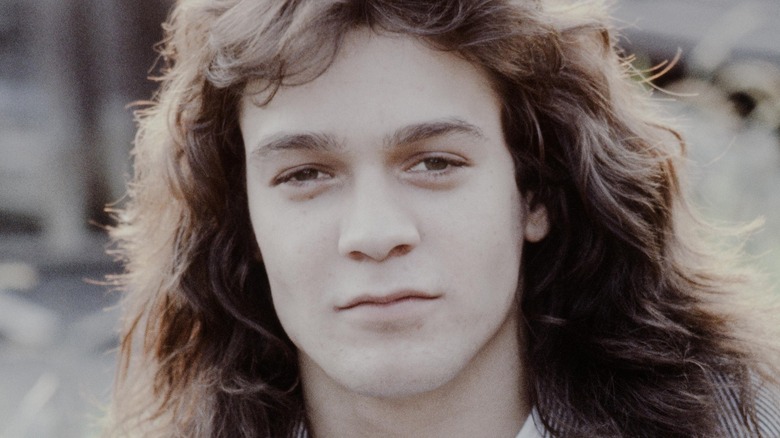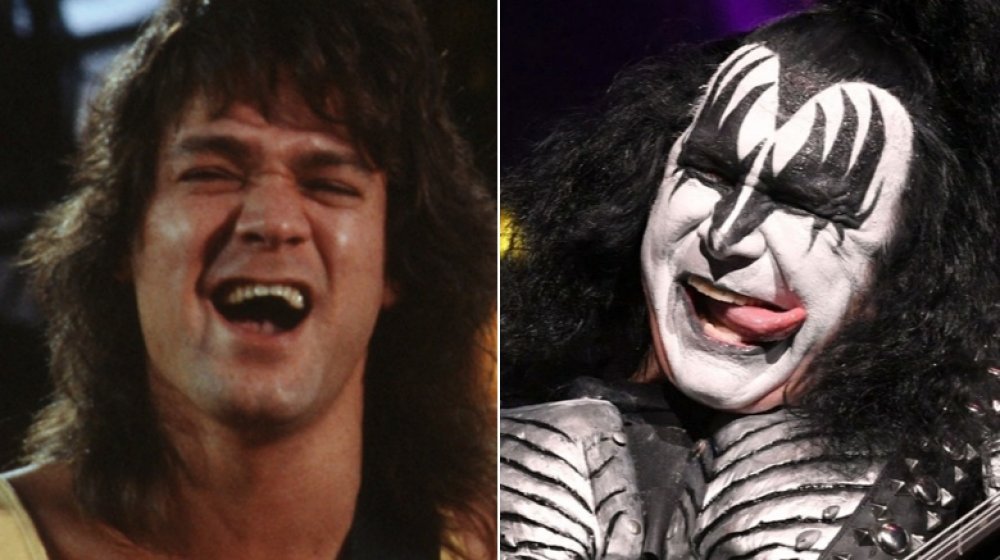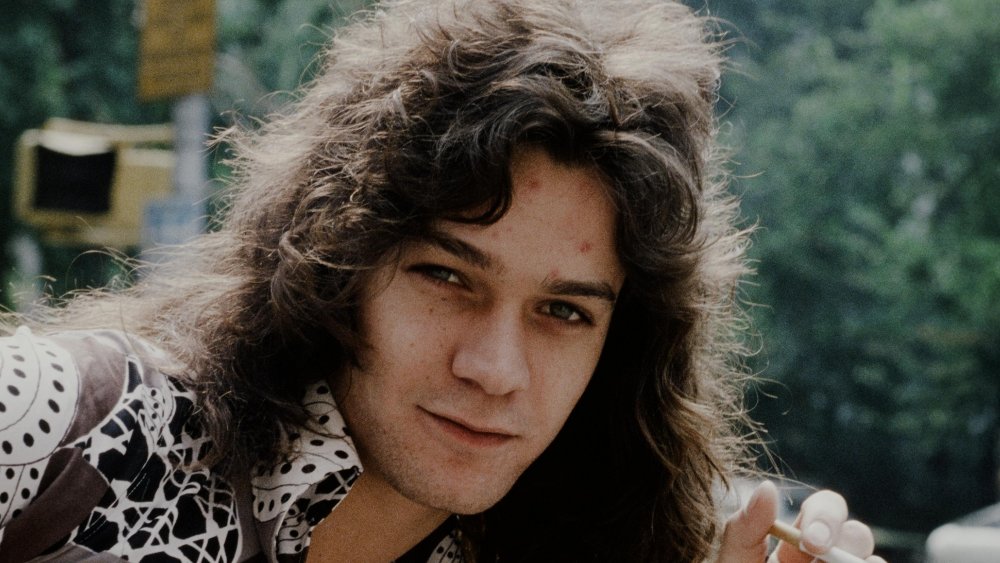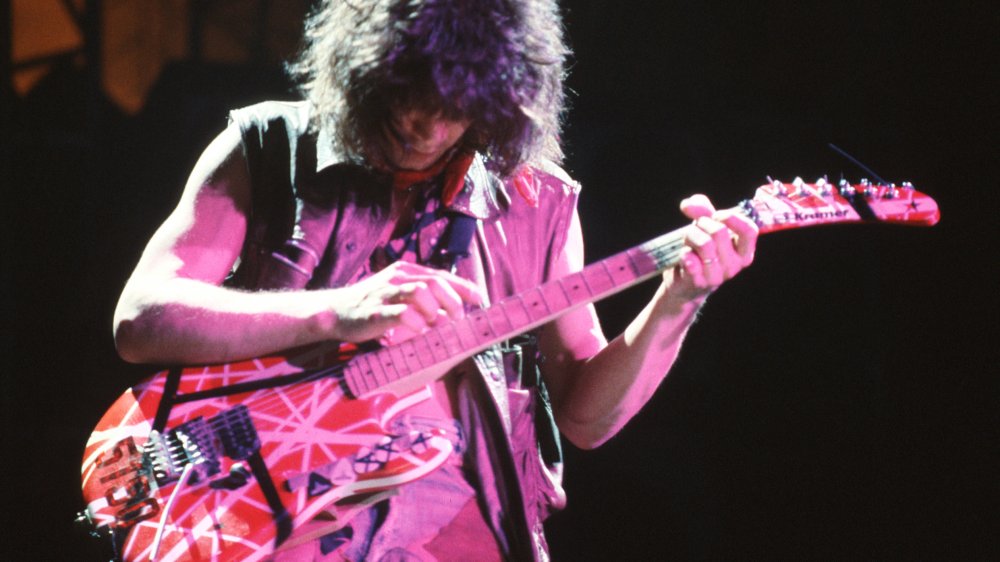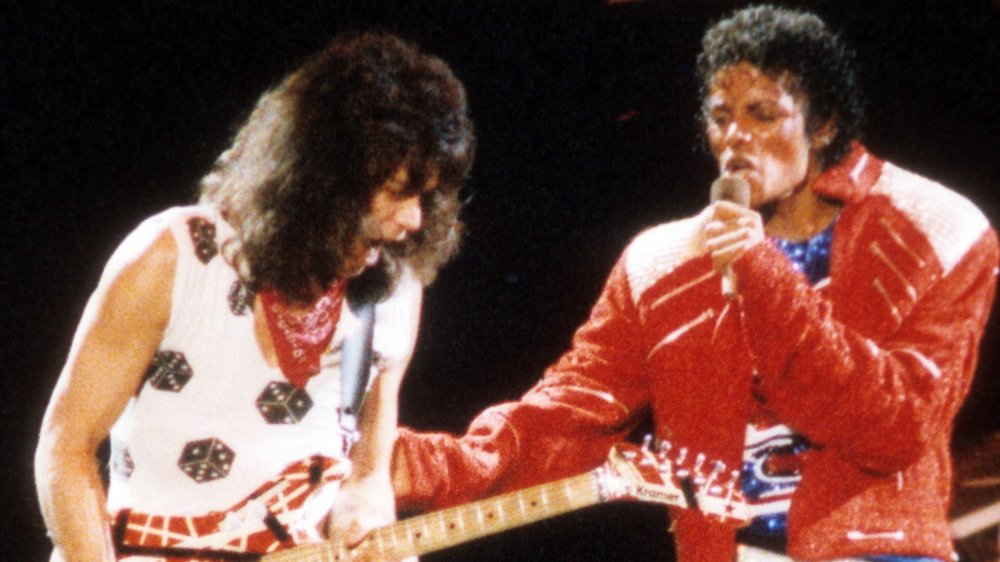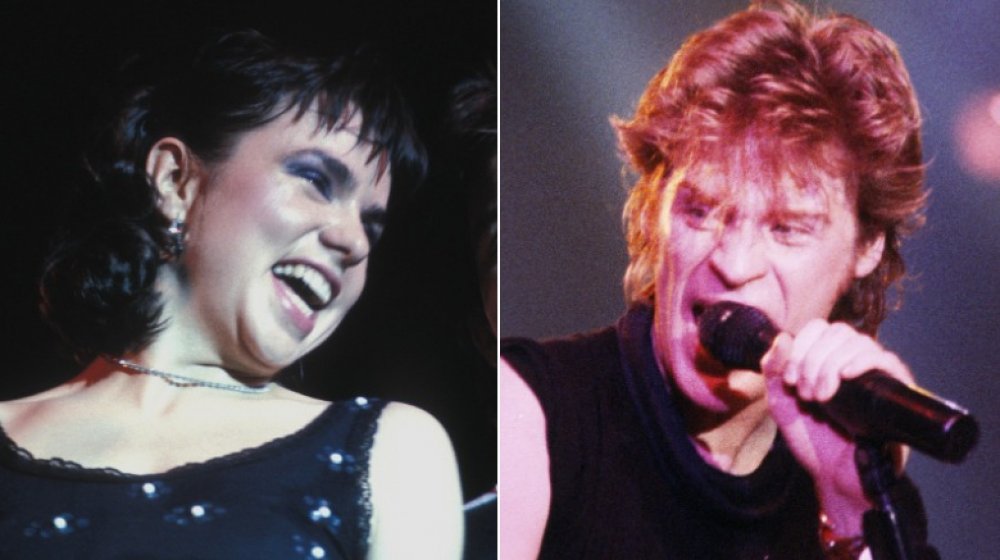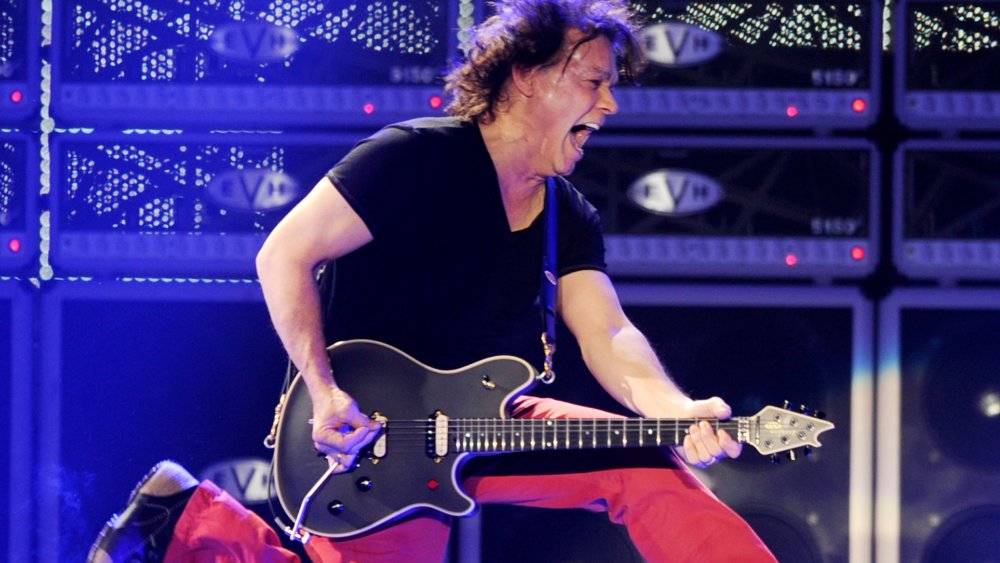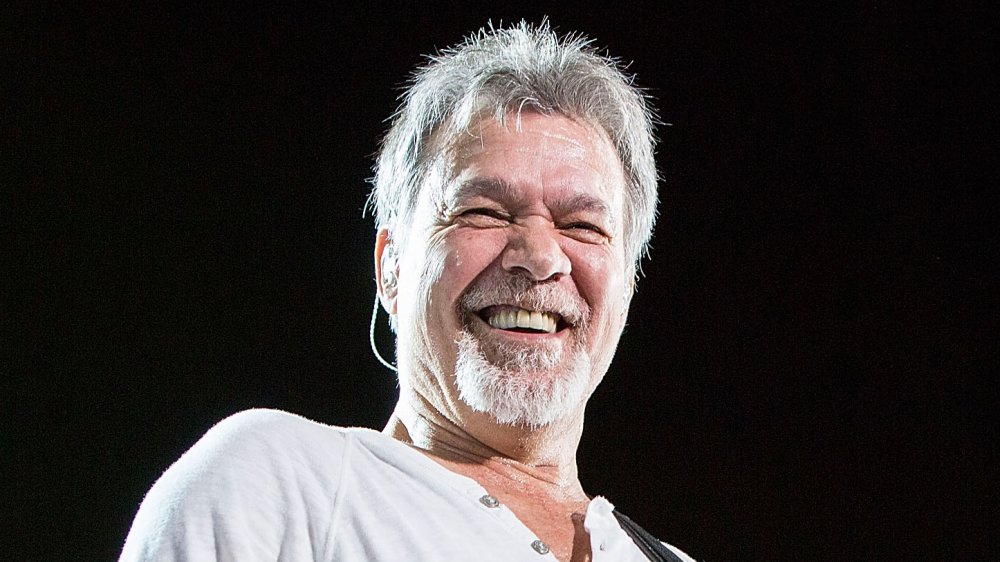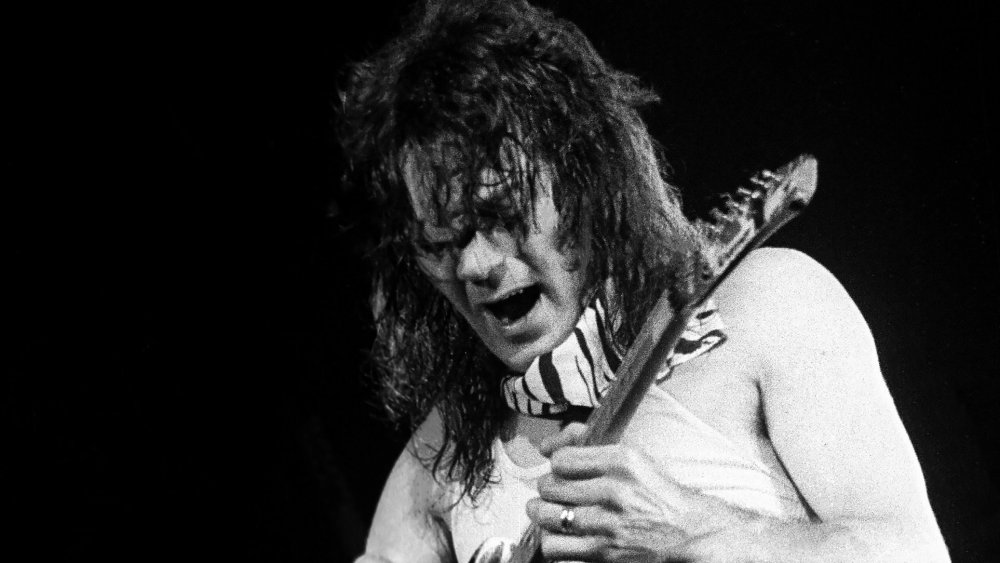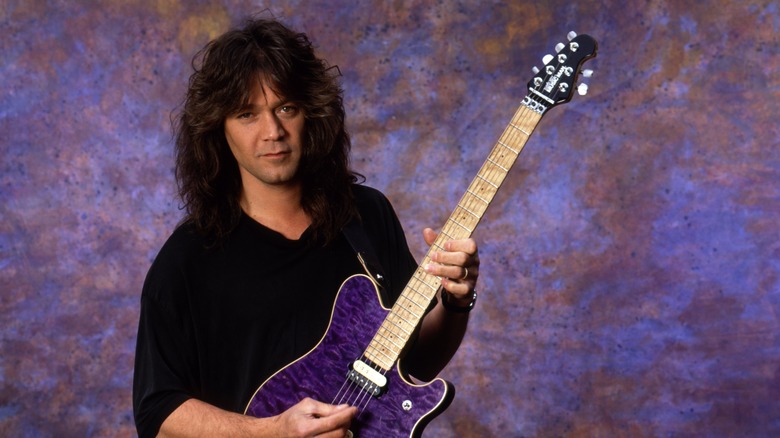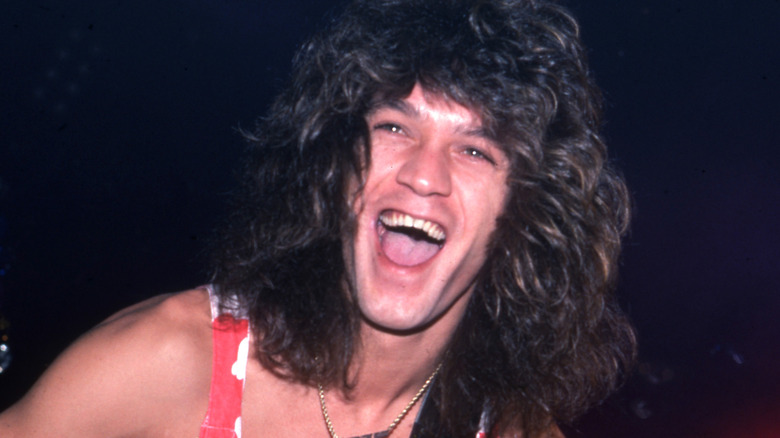The Untold Truth Of Eddie Van Halen
The electric guitar is the definitive instrument of rock 'n' roll, and only a few musicians to ever strap on an ax can claim to be the greatest — it's pretty much just Jimi Hendrix, Eric Clapton, and Eddie Van Halen. In 1978, the 23-year-old showed the world he had the goods with the release of his self-titled band's self-titled album, which included rock radio classics like "Runnin' with the Devil" as well as "Eruption," a brain-melting instrumental that consists of Van Halen by himself shredding a series of seemingly impossible licks for just under 2 minutes. Van Halen would get even bigger in the '80s with the seminal album "1984" and kept churning out the hits even after surviving a change of lead singer from David Lee Roth to Sammy Hagar. It's hard to keep a band down when it's ruled by one of the most supernaturally skilled rock stars of all time.
Van Halen created countless licks on dozens of songs, and almost every budding guitarist strived to sound like him. Here's a look into the wondrous professional life and sometimes tumultuous personal life of Eddie Van Halen.
Eddie Van Halen gets a Kiss
Van Halen was the biggest hard rock band since KISS. According to "Edward Van Halen: A Definitive Biography", KISS co-leader Gene Simmons was scouting talent for Casablanca Records in 1976 when he discovered Van Halen playing a show in West Hollywood. Simmons liked the group and booked them some studio time to record demos of 12 songs and then flew the guys to New York City for overdubs at Jimi Hendrix's Electric Lady Studios and to play at a showcase for KISS' manager, Bill Aucoin. He declined to take on Van Halen as clients, but after the band returned to California, Simmons recruited Eddie Van Halen (and his brother, drummer Alex Van Halen) to demo songs for the next KISS album, "Love Gun." When KISS' actual guitarist Ace Frehley was tasked with recording the song "Christine Sixteen," his solo was a note-by-note recreation of Eddie Van Halen's attempt.
A few years later, around 1982, Van Halen was so tired of clashing with singer David Lee Roth that he attempted to join KISS, then in the process of splitting with guitarist Ace Frehley. "Eddie said, 'I want to join KISS. I don't want to fight anymore with Roth,'" Simmons told Guitar World (via Rolling Stone). The KISS leader convinced him it wasn't a good fit. "I told him, 'Eddie, there's not enough room. You need to be in a band where you can direct the music.'"
A cure for stage fright turned into a problem for Eddie Van Halen
Eddie Van Halen went into the family business: music. According to the Van Halen News Desk, his father, Jan Van Halen, was a clarinetist and saxophonist in the jazz and big band styles popular in the middle of the 20th century, and he performed with combos in his native Netherlands. When he moved to California, he took gigs playing in country clubs. Performing for a crowd came easily for the elder Van Halen, or at least it seemed that way to Eddie Van Halen when he began gigging and suffered from stage fright. "When I started playing in front of people, I'd get so damn nervous," Van Halen told Esquire (via ABC News). "I asked him, 'Dad, how do you do it?' That's when he handed me the cigarette and the drink. And I go, 'Oh, this is good! It works!'"
The booze relaxed Van Halen, albeit at tremendous cost: He struggled with alcohol abuse for decades. "I got drunk before I'd show up to high school," he told Billboard, adding that vodka became his tipple of choice on the recommendation of his science teacher. In 1988, after the alcohol-related death of his father, Van Halen told Rolling Stone that he'd quit drinking, but the sobriety didn't stick. He eventually started drinking heavily again, and in 2007, he checked himself into a rehabilitation clinic, which made him miss Van Halen's induction into the Rock and Roll Hall of Fame.
If you or anyone you know is struggling with addiction issues, help is available. Visit the Substance Abuse and Mental Health Services Administration website or contact SAMHSA's National Helpline at 1-800-662-HELP (4357).
Eddie Van Halen inspired a guitar revolution
One does not get named Guitar World's greatest guitarist ever (among other world-class honors) simply by playing the electric guitar well — Eddie Van Halen completely reinvented the way the instrument was played and could be played, crafting a one-of-a-kind sound that would influence hard rock contemporaries and successors alike.
According to Rolling Stone, Van Halen devised a rock guitar playing method called "finger tapping," in which he played the guitar's fretboard like a piano, with two hands, rather than finding notes with one set of fingers and strumming with the other. The result, as heard on songs like "Eruption": unrivaled speed, precision, a wider freedom in terms of available notes, and just all-around totally metal shredding. It was so different that his brother, drummer Alex Van Halen, advised him during early gigs to play with his back to the audience so nobody would steal his moves.
If Van Halen couldn't get the exact sound he wanted out of a particular guitar, he'd alter the thing, using saws and sandpaper to modify the instrument. Van Halen's most famous guitar, a red instrument splashed with white and black stripes and blotches, was known as "Frankenstein" (or "Frankenstrat"), a concoction the musician built himself out of a $50 body and an $80 neck. The piece is so famous that a replica currently resides in the Smithsonian.
How Eddie Van Halen Beat It
The only act with a popularity that could rival Van Halen's in the mid-1980s was Michael Jackson. He dominated pop music with "Thriller", a mega-hit that went on to sell 66 million copies. There was a little something for everyone on "Thriller" – jaunty soft pop ("Human Nature"), funky post-disco ("Billie Jean"), and even hard rock with "Beat It." Its centerpiece: a speedy, mind-blowing, electric guitar solo that couldn't have come from anybody besides Eddie Van Halen. And to think, he almost didn't even do it.
When producer Quincy Jones called Van Halen to ask him to contribute, he thought it was a prank call. "I went, 'What do you want, you f***ing so-and-so!'" Van Halen told CNN. They sorted it out, and Jones asked Van Halen to "come down and play on Michael Jackson's new record," and even though he was still not "100 percent sure" he wasn't being pranked, Van Halen headed to the studio the next day. While Jackson stepped out briefly to record another project, Van Halen listened to a rough cut of "Beat It," offered some arrangement tips, and laid down two improvised guitar solos. It all took about 30 minutes. Van Halen didn't accept payment, doing it as a favor to Jones, and initially refused credit, too: "I said to myself, 'Who is going to know that I played on this kid's record, right? Nobody's going to find out.'" But they did — "Beat It" hit #1 on the pop chart.
Eddie Van Halen had some interesting ideas for David Lee Roth's replacement
In 1985, when Van Halen was at its commercial peak thanks to the multiplatinum success of the album "1984," which generated the #1 hit "Jump" and other songs whose music videos became early MTV staples, over-the-top lead singer David Lee Roth left the group to pursue a solo career. Van Halen, one of the biggest acts in the world at the time, wasn't ready to split up and desperately sought out a singer, any singer, that could replace the inimitable Roth.
As the unofficial leader of the band (and its co-namesake), guitarist Eddie Van Halen took on the laborious and difficult task of leading the search that would ultimately end with veteran hard rock wailer Sammy Hagar fronting the band. Van Halen's initial shortlist of candidates was provocative, to say the least. "Eddie asked me to join Van Halen," singer Patty Smyth of the band Scandal (responsible for the big 1984 hit "The Warrior") told Delaware's News Journal in 2014. Van Halen and his bandmates "had asked me not to talk about in interviews at the time, because they didn't want Sammy Hagar to feel like he was the second choice."
Another musician Eddie Van Halen purportedly heavily pursued: soulful pop crooner Daryl Hall of the mega-successful Hall & Oates. When Hagar guested on Hall's "Live From Daryl's House," he asked Hall about the rumor. Hall confirmed that it happened and that he passed.
Eddie Van Halen was the Thomas Edison of rock
One could argue that through his various innovations and techniques, Eddie Van Halen invented modern hard rock. It can also be argued that he's literally an inventor. The musician (under his full, professional name of "Edward Van Halen") was granted three patents by the United States federal government for his guitar-related inventions.
In 1985, Van Halen filed for patent protection on "Musical instrument support," a device that holds up a guitar, banjo, or mandolin on its player so sturdily that the musician has their hands totally free, so as "to explore the musical instrument as never before" while enjoying full visibility of the playing surface. According to the documents associated with Van Halen's "Guitar Peghead," patented in 1997, the device is an "ornamental design for a guitar peghead," also called a headstock. Then, in 2003, Van Halen made moves to patent "Stringed instrument with adjustable string tension control," a built-in guitar tuning accessory.
Eddie Van Halen goes solo
Unlike his bandmates David Lee Roth or Sammy Hagar, Eddie Van Halen never officially launched a solo career — likely because he was the chief creative voice and leader of a tremendously successful band with whom he shared a name. He released scarcely few recordings outside of Van Halen, little more than the 1984 song "Donut City" on the soundtrack to the movie "The Wild Life," a "Twister" soundtrack cut with brother Alex Van Halen called "Respect the Wind," a cover of the "Top Gun" theme song, and two cuts for a film called "Sacred Sin."
"I like his work. Michael Ninn is like a Spielberg to me: the imagery, the way he makes things look, just ... sensual," Van Halen told AVN (via Spin) of the film's director, whom the guitarist called "a friend." Van Halen offered "Catherine" and "Rise" to the straight-to-video film, described (via Ultimate Classic Rock) as "the story of how we handle the pain of loss, the story of how our innermost sexual mechanisms help us cope, or give up faith completely." It starred Penthouse model Heather Vuur, and yes, "Sacred Sin" is very much an "adult film."
Eddie Van Halen fought a long battle with cancer
Eddie Van Halen started developing serious health issues in the mid-1990s. He nicknamed Van Halen's tour supporting the album "Balance" the "Ambulance tour," because he played through intense hip pain, and after delaying replacement surgery for years, he underwent the procedure in 1999. According to USA Today, Van Halen got a bionic hip because of bone death in the femoral ball part of the hip.
Van Halen was also a longtime chain-smoker, according to Ultimate Classic Rock Nights, although in 2015, he switched to vaping because that was easier than cigarettes. Around a third of his tongue was surgically removed in 2000, according to TMZ. The cancer spread to his throat, and while he received a clean bill of health in 2002, he commuted to Germany for special treatments for years, per TMZ. Interestingly, Van Halen didn't blame his cancer on his years of smoking. "I used metal picks — they're brass and copper — which I always held in my mouth, in the exact place where I got the tongue cancer," Van Halen told Billboard. "Plus, I basically live in a recording studio that's filled with electromagnetic energy."
According to TMZ, in 2020 Van Halen's condition took a turn for the worse. The cancer had returned and spread to his brain. On October 6, Eddie Van Halen died at St. John's Hospital in Santa Monica, California, his wife and relatives/bandmates (brother Alex and son Wolfgang) at his bedside. The guitar hero was 65.
English wasn't his first language
Eddie Van Halen was one of the most quintessential American musicians, defining and refining the sound of hard rock in the '70s and '80s through his eponymous band with his older brother. Both Eddie and Alex Van Halen are immigrants, born in the Netherlands in the 1950s and who moved with their parents to Pasadena, California when they were both of elementary school age.
Upon his arrival in the United States and entry into the school system, Van Halen experienced a tremendous amount of bullying and physical violence on account of his immigrant status and a language barrier. "I wasn't able to speak English and used to get my a** kicked because I was a minority," Van Halen told Rolling Stone in 1998. The future guitar legend didn't speak much English, the predominant language in the United States at the time, until he was 7 years old.
Eddie Van Halen didn't read music
As one of the most objectively talented and skilled people to ever pick up a guitar (or play rock piano, for that matter), Eddie Van Halen was inarguably and universally regarded as a musical virtuoso. But unlike his more mainstream, heavily trained musical predecessors, Van Halen achieved everything he did — writing, recording, producing, and playing hundreds of songs — without having first learned how to read musical notation. In fact, across his five decades-plus career, Van Halen never learned how to read music very well; he simply knew how to play the guitar so well that he could compose on his instrument.
According to Guitar World, child Van Halen won three annual prizes at a Long Beach City College piano competition, despite not knowing how to interpret the sheet music presented to him, and the habit followed him when he switched to guitar. "I used to fool the teacher. I did it all by ear," he said, adding that he can recognize notes on a page but can't sight-read. "I guess the reason it didn't get me off in any way was that all it's good for is to learn how to play songs that have been written."
